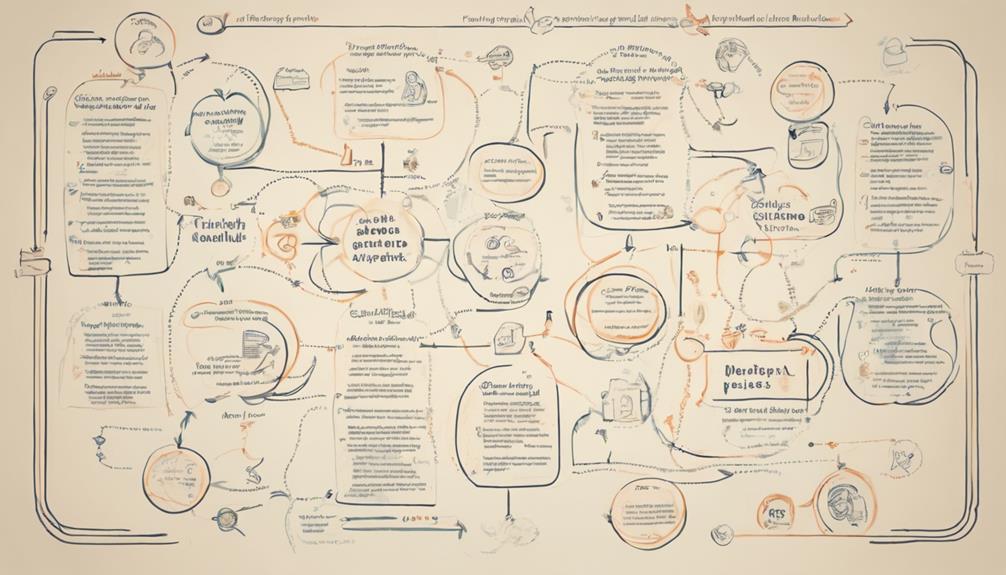Foamy baby poop can sometimes seem like an enigma, leaving us questioning what could be causing this unexpected sight. As caregivers, we aim to decipher the mysteries behind our little one's bowel movements, and foamy poop is no exception.
Curious to uncover the secrets behind this phenomenon? Let's explore five common reasons that might shed light on why your newborn's poop appears frothy.
Key Takeaways
- Immature digestive system leads to inefficient nutrient breakdown and excess mucus in stool.
- Food sensitivities like cow's milk or soy can cause green frothy stools in newborns.
- Excessive mucus production from various factors contributes to foamy poop appearance.
- Rapid digestion and bacterial imbalance can result in foamy stools, indicating digestive issues.

Similac Sensitive Infant Formula, for Fussiness & Gas Due to Lactose Sensitivity, Baby Formula Powder, 29.8-oz Value Can
GET MORE REWARDS POINTS: Scan the MySimilac QR code on select products to earn points toward a Reward
As an affiliate, we earn on qualifying purchases.
As an affiliate, we earn on qualifying purchases.
Digestive Immaturity
In newborns, digestive immaturity plays a significant role in the development of foamy poop. Their immature digestive systems struggle to process breast milk or formula efficiently, leading to foamy stool. The excess mucus present in their stool adds to the foamy appearance, a common indicator of digestive immaturity in infants. This immaturity extends to their digestive enzymes, which may not effectively break down nutrients, resulting in frothy stools, particularly when dealing with the rich components of breast milk.
Understanding that as newborns grow, their digestive systems mature and become more adept at handling the nutrients they consume. This maturation process is important for reducing the occurrence of foamy poop. Thus, parents should be patient and allow their baby's digestive system the time it needs to develop properly. By recognizing and supporting the digestive needs of newborns, caregivers can help ease the shift to more regular stool consistency over time.

Enfamil Nutramigen Hypoallergenic Baby Formula with Iron, Lactose Free, Colic Relief from Cow's Milk Allergy Starts in 24 Hours, Brain Building DHA, Probiotic LGG for Immune Support, 19.8 Oz Can
HELPS TO EASE COLIC: Delivers Clinically-Proven Relief when managing colic due to cow’s milk allergy for a happier,…
As an affiliate, we earn on qualifying purchases.
As an affiliate, we earn on qualifying purchases.
Food Sensitivities

Newborns' digestive immaturity can also manifest as food sensitivities, potentially leading to green frothy stools and other digestive issues. When infants react to certain foods, their stool consistency and color can change. Common allergens like cow's milk, soy, egg, wheat, and gluten are known culprits for causing green frothy stools in babies. Even less common allergens such as peanuts and corn can trigger digestive issues and result in foamy poop. To manage these food sensitivities effectively, parents can consider lactose-free milk, alternative dairy options, or hypoallergenic formulas. For infants sensitive to cow's milk, alternatives like goat's milk or hemp milk are better-tolerated options. Addressing food sensitivities promptly is essential for improving digestive health and maintaining healthy stool consistency in newborns.
| Allergens | Effects on Stool | Management Strategies |
|---|---|---|
| Cow's Milk | Green frothy stools | Lactose-free milk |
| Soy | Digestive issues | Alternative dairy options |
| Egg | Changes in stool consistency | Hypoallergenic formulas |
| Wheat & Gluten | Altered stool color | Prompt identification |

BioGaia Protectis Baby Probiotic Drops | Baby Essentials for Colic & Gas Relief | Safe for Newborns | Ease Crying, Fussing, Colic, Gas, Spit-ups & Constipation | No Dairy, Soy & Gluten | 5mL
SOOTHES CRYING, FUSSING, COLIC & GAS: For over 20 years, BioGaia Baby has been soothing babies with colic…
As an affiliate, we earn on qualifying purchases.
As an affiliate, we earn on qualifying purchases.
Excessive Mucus
Excessive mucus accumulation in a newborn's digestive system can contribute to the presence of foamy baby poop. When dealing with excessive mucus in a newborn, it's important to understand the various factors that could be causing this issue.
- Increased mucus production: Factors like teething, illness, or food sensitivities can lead to a surge in mucus production in the digestive tract.
- Swallowing excess air: Strong letdown during feeding can cause babies to swallow more air, leading to the development of frothy stools due to increased mucus.
- Foremilk and hindmilk imbalance: If a baby consumes more foremilk than hindmilk during breastfeeding, it can result in mucus buildup and foamy poop.
- Monitoring symptoms: Keeping an eye on symptoms like fussiness and mild fever can help in identifying the root cause of excessive mucus in newborns.
- Seeking guidance: If you notice persistent foamy poop or are concerned about your baby's health, consulting a healthcare provider is important for proper evaluation and management.

Dr. Talbot's Mucus + Cold Relief Liquid Medicine, Naturally Inspired, for Children, Includes Dosage Cup, Natural Grape Juice Flavor, 4 Fl Oz
Dr. Talbot's mucus + cold Relief provides temporary relief for runny nose, cough, sinus congestion and thick mucus….
As an affiliate, we earn on qualifying purchases.
As an affiliate, we earn on qualifying purchases.
Rapid Digestion
Shifting from excessive mucus in a newborn's digestive system, rapid digestion can lead to the development of foamy baby poop as food swiftly moves through the digestive tract. In newborns, the digestive system is still developing, and this immaturity can sometimes result in rapid digestion. This quick movement of food through the intestines can lead to inefficient digestion, causing excess gas production and the production of frothy stools.
When the body struggles to fully break down nutrients, it can result in the passing of bubbly feces. It's essential for parents to monitor the frequency and consistency of their baby's foamy poop to track any potential digestion issues. Rapid digestion is a common occurrence in infants and is usually nothing to worry about. However, if parents notice persistent foamy stool along with other concerning symptoms, consulting a healthcare provider is suggested to make sure the baby's digestive health is on track.
Bacterial Imbalance
The gut's bacterial balance plays an important role in determining the digestion process and can greatly impact the appearance of newborns' stool. When there's a bacterial imbalance in the gut, it can lead to frothy poop in newborns.
Here are some key points to bear in mind regarding bacterial imbalance and frothy poop:
- Changes in the gut microbiota can result in excessive gas production, causing frothy stools.
- Imbalance of beneficial and harmful bacteria can influence stool consistency and appearance in newborns.
- Disruption in the bacterial composition of the gut can impact the breakdown of nutrients, contributing to foamy poop.
- Maintaining a healthy balance of gut bacteria is essential for proper digestion and stool formation in newborns.
Understanding the delicate balance of the gut microbiota in newborns is essential for recognizing how bacterial imbalance can manifest in their stool consistency. By ensuring a healthy gut environment, parents can promote the best digestion and prevent issues like frothy poop in their newborns.
Frequently Asked Questions
Why Is My Newborns Poop Foamy?
When your newborn's poop is foamy, it could be due to various reasons like an oversupply of breast milk or swallowing air during feeds. Consider factors such as teething, illness, or food sensitivities.
What Does Foamy Stool Indicate?
Foamy stool in newborns can indicate various issues like an imbalance in milk intake, air swallowing during feeding, or teething-related mucus production. Monitoring for accompanying symptoms is important to understand the cause accurately.
Why Is My Poop Frothy When Breastfeeding?
When breastfeeding, our baby's poop may become frothy due to an imbalance in milk composition, leading to excess gas intake and frothy stools. Seeking advice from lactation experts, adjusting feeding techniques, and monitoring milk flow can help regulate this issue.
Does Lactose Intolerance Cause Foamy Stool?
Yes, lactose intolerance can cause foamy stools in newborns. When unable to digest lactose, found in milk, it ferments in the colon, producing gas and frothy stools. Managing with lactose-free options or enzymes aids digestion.
Conclusion
To sum up, understanding the potential reasons behind your newborn's foamy poop can help address any concerns and guarantee their digestive health.
By recognizing factors such as digestive immaturity, food sensitivities, excessive mucus, rapid digestion, and bacterial imbalance, you can take steps to support your baby's well-being.
Remember, seeking guidance from healthcare professionals can provide valuable insights and assistance in managing your baby's digestive issues.
Stay informed and proactive to promote a healthy start for your little one.









